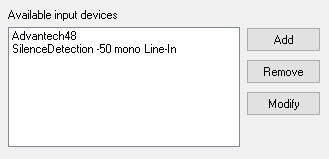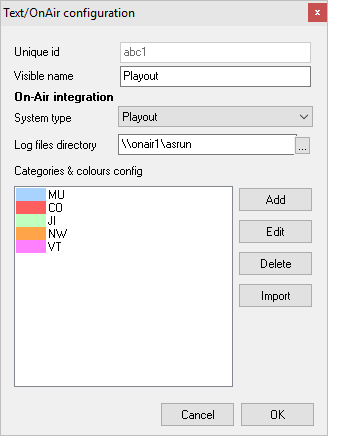Metadata module is responsible for collecting metadata events for recorded stations. Events include as-run log elements from automation system, GPI signals (such as microphone opening), loudness reports, signal levels and any kind of data that can be read out of standard text files. Metadata module also captures data that are sent within captured streams - like EPG, DVB events, teletext, subtitles.
Available input devices: shows list of enabled GPI input devices. This may be hardware GPI/O cards, IP input sources including audio over IP drivers (Axia, Wheatstone) or built-in silence detector.
- [ Add ] - adds device to list of devices used by SML
- [ Remove ] - removes device from list
- [ Modify ] - modifies device configuration (if possible)
Events: shows list of defined inputs from devices listed above. Each event on the list is for single input - even if the input device has multiple inputs.
- [ Add ] - adds new event definition
- [ Remove ] - removes event - SML will no longer capture it
- [ Modify ] - modifies event configuration and description
Text/OnAir: shows list of text sources that are read by SML. This may be as-run log from playout or any text files that are structured and have information about airtime for events stored in the file.
- [ Add ] - adds new as-run folder and format to scan
- [ Remove ] - removes as-run definition. SML will no longer read and display log contents
- [ Modify ] - modifies as-run log parameters and description
Tuners: shows list of FM tuner card used for capturing radio stations.
- [ Add ] - adds new tuner card to list
- [ Delete ] - removes tuner from list
Loudness reports: (video stations only) generates reports of loudness levels against as-run log on selected station and audio track. Useful for loudness verification for particular parts of broadcast (i.e. commercials)
- [ Add ] - adds new report definition
- [ Remove ] - removes report
- [ Modify ] - modifies report parameters
Editable metadata: allows to add custom metadata events using SML Player
- [ Add ] - adds new metadata category
- [ Remove ] - remove metadata
- [ Modify ] - modifies descripton
GPI events
In order to collect events from GPI/O cards, SML has to know which signals to collect and from which device. Also, what is the meaning of each defined signal.
GPI device configuration:
- Click [ Add ] to open list available devices
- Select device from list.
- For IP devices complete setup adding IP number and port of listening device.
For silence detection select audio device that will listen to your program bus, set audio mode and audio level considered as silence
For hardware cards, additional setup may be needed - like card number or hardware port address
- Once device is listed, proceed to event configuration

GPI event configuration:
- Click [ Add ] to open Event configuration window
- Enter event details
Unique id: give a unique identifier for created event
Visible name: label to show in SML Player - i.e. "DJ Mic"
Source: select the capturing device
Input: select the input of the device for this event
Reverse input state: if checked, event will be triggered by switching off input
Send email INFO...: if checked, SML will send e-mail notofication to the address specified in Alarms module if event is active longer than time specified
Colour: click to set individual colour for event. This color will be presented on SML Player timeline and the event list
- Once defined, event will show up on the list.

Click [ Save ] to store device and event configuration and close Meta config window. SML will restart Metatada module to start capturing new metadata sources.
Text-Onair events
SML can read and display contents of any kind of text files hoaving data related to recorded station. This may be as-run logs and other reports.
SML Server comes with few as-run formats defined. If your playout system is not listed, or you wish to import non-playout data, please contact support and send us sample file.
Sample as-run log format:
00:00:00 Jingle My Radio TOH Jingle 00:20
00:00:20 Music ABC The look of love 03:00
00:03:20 Music Level 42 Guaranteed 04:43
As-run log configuration:
- In Text/Onair section of Meta config window click [ Add ] to open Text/Onair config
- Enter as-run log details:
Unique id: give a unique identifier for configured source
Visible name: metadata source label to show in SML Player - i.e. playout name
System type: Select automation system format. SML Server comes with few as-run formats predefined. If your playout system is not listed, or you wish to import non-playout data, please contact support.
Log files directory: Folder where logs are stored. Typically, it will be the folder where automation system saves as-run log.
Categories and colours config: if log file provides information about category of each event, SML Player can display each category in defined colour. Also, similar categories can be grouped by allocating the same Description.
- Click [ Add ] to define new event category
- Enter category name as saved in log - i.e. "Music", "MUS"
- Give the category Description - it will be label for event list and tabs in SML Player
- Click [ Colour ] to give category its individual colour on the list / tab
Categories found in log file and not configured will show up in SML Player on grey tabs, named as in the log.
- Click [ OK ] to add configuration to list.

Click [ Save ] to store Text/OnAir configuration chances and exit Meta config window.
SML will restart Metadata module and start reading log folder. Once read, events will show up in Players.
Tuners
Tuners section is for configuring RDS (Radio Data System) capture from FM Tuner PCI(e) cards.
Please contact support for configuration
Ratings
SML Server can also read ratings information (like number of people watching or listening to the station).
Please contact support for configuration.
Loudness reports
Loudness reports read loudness data captured when recording station and combine it with as-run logs allowing it to generate Loudness Breaches reports
Loudness report configuration:
- Click [ Add ] to open configuration window
- Enter report parameters:
Name: Set the name for report - it will be displayed in SML Player
Station: Select station name that will be source for report
Audio track: Select audio track to analyze
Text metadata: Select as-run log that you want to combine with loudness data captured from audio track
Commercial: Enter name of commercial category from playout - as stored in log
Programme: Enter name of categories that indicate regular non-live programming - as stored in log. Multiple categories allowed (comma separated).
Live programme: Enter names of categories that indicate live programme
- Click [ OK ] to add configuration to list of report

Click [ Save ] to store Text/OnAir configuration chances and exit Meta config window. SML will restart Metadata module and start reading log folder. Once read, events will show up in Players.
Editable metadata
SML Server can also store metadata placed in the archive manually using SML Player.
Editable metadata configuration:
- In Editable metadata click [ Add ] to open configuration window
- Enter medatada details:
Unique id: give a unique identifier for created metadata
Visible name: set the friendly name that will show up in metadata list of SML Player
- Click [ OK ] to add configuration to list of report
Click [ Save ] to store Text/OnAir configuration chances and exit Meta config window. SML will restart Metadata module and start reading log folder for events to show.
IMPORTANT!
For all metadata sources:
Adding Metadata source does not mean it will be instantly visible in SML Player.
Once you add new metadata source for station, go back to that station configuration and check the created source in Meta section.
Only active/checked sources will be visible for that station.

When connecting to remote storage for as-run logs and other file reports, make sure that the drive you want to read from is accessible by the Windows user that is running SML Server.
Check
SML Service configuration for more information.






